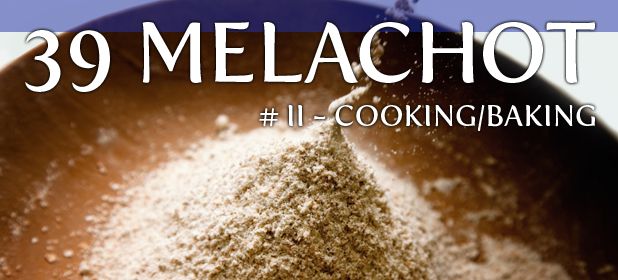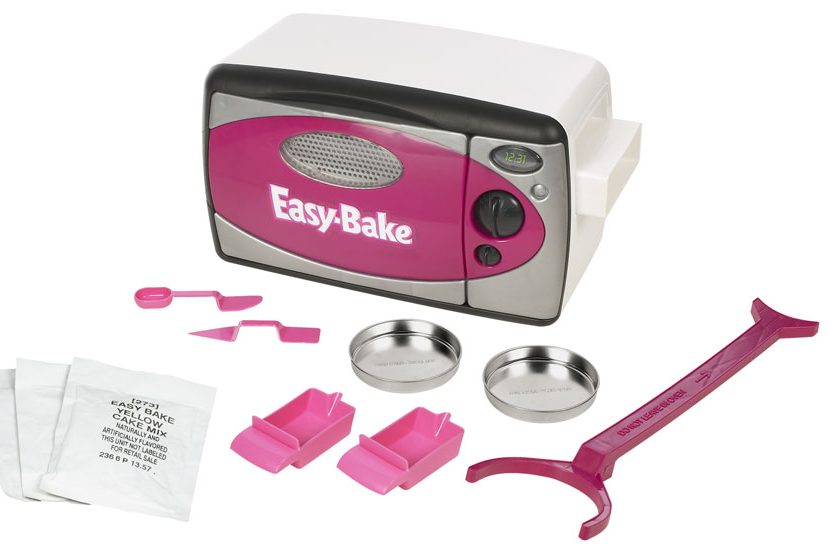As noted earlier, the first eleven melachot are collectively referred to a “sidurah d’pas,” the order of bread. Accordingly, the eleventh melacha listed in the mishna (Shabbos 4:2) is ofeh (baking), the final step in making bread. However, while the show bread was used in the Mishkan, it was not a part of its construction. In building the Mishkan, herbs were boiled to produce dyes for the curtains. This is called bishul (cooking). Ofeh and bishul are effectively the same melacha, referring to the use of heat to effect a change in food or other items (for example, firing bricks in a kiln). Here, we will refer to it by the more common name of bishul.
 As mentioned, bishul occurs when something is heated to the point that a change occurs (though this is not the case with liquids). Normally, this change entails rendering food fit to eat. An object does not have to be completely cooked in order for the act to be considered bishul; one-half or even one-third cooked might be good enough for a person to eat in a pinch.
As mentioned, bishul occurs when something is heated to the point that a change occurs (though this is not the case with liquids). Normally, this change entails rendering food fit to eat. An object does not have to be completely cooked in order for the act to be considered bishul; one-half or even one-third cooked might be good enough for a person to eat in a pinch.
Bishul occurs at a temperature that is considered “yad soledes bo,” namely that a person will instinctively draw his hand back upon touching it. This is generally accepted as around 110 degrees Fahrenheit, plus or minus based on the authority you ask. In any event, one wouldn’t be measuring the temperature of a pot on Shabbos. If you touch it and pull your hand back, that’s yad soledes bo!
There are many halachos related to cooking on Shabbos and a person is likely to encounter a bishul issue at least once every Shabbos. (This especially true since we are specifically supposed to eat hot food on Shabbos – quite the dilemma, eh?) A few practical applications follow but these are very much just the tip of the iceberg:
- One may not help something to cook by moving it closer to the flame, by removing some of the food (so that the remainder cooks faster) or even by stirring the pot;
- One may not leave food to cook over Shabbos on an uncovered flame. Accordingly, we cover our stove tops with a sheet of metal called a blech (Yiddish for tin);
- Something fully cooked that was removed from the blech may be returned so long as it is still warm if one had the intention to do so and held on to it the whole time;
- A dry, solid item (such as a kugel or some chicken) may be warmed on Shabbos by placing it on top of something that is on the blech (though one may not place it on the blech itself);
- The pot on the fire is a kli rishon (first vessel) and it cooks. Pouring the contents of the pot into a second vessel makes the new utensil a kli sheini, which doesn’t cook in most cases. To make coffee or tea on Shabbos, one should pour water from a kli sheini to a kli shlishi (third vessel), then add the tea bag or instant coffee. Halachically, this is not cooking. (Yes, the water may still be pretty hot, but look how far removed it is from the original heat source!);
- One may not insulate a pot with a blanket in order to retain its heat. (This is called hatmanah; it is discussed in the chapter of Bameh Madlikin, which we read on Friday nights.)
Bishul is also the reason that one is not permitted to bathe on Shabbos – as a preventive measure against heating the water.
The laws of bishul are very many and we’ve barely begun to address them here. If any area of Shabbos observance calls for further study, this is it.
This is just an introduction to the concepts of the melacha of bishul; it is not a substitute for a full study of the halachos.
